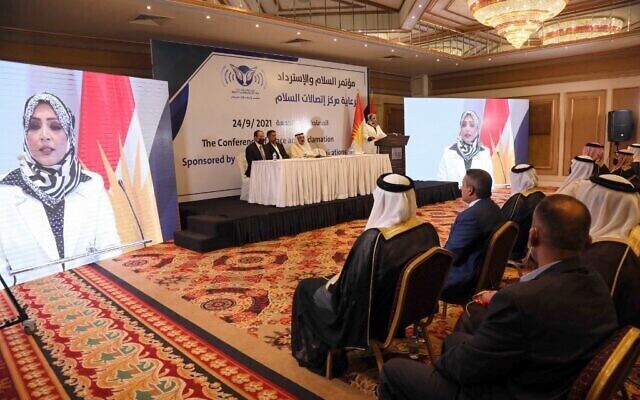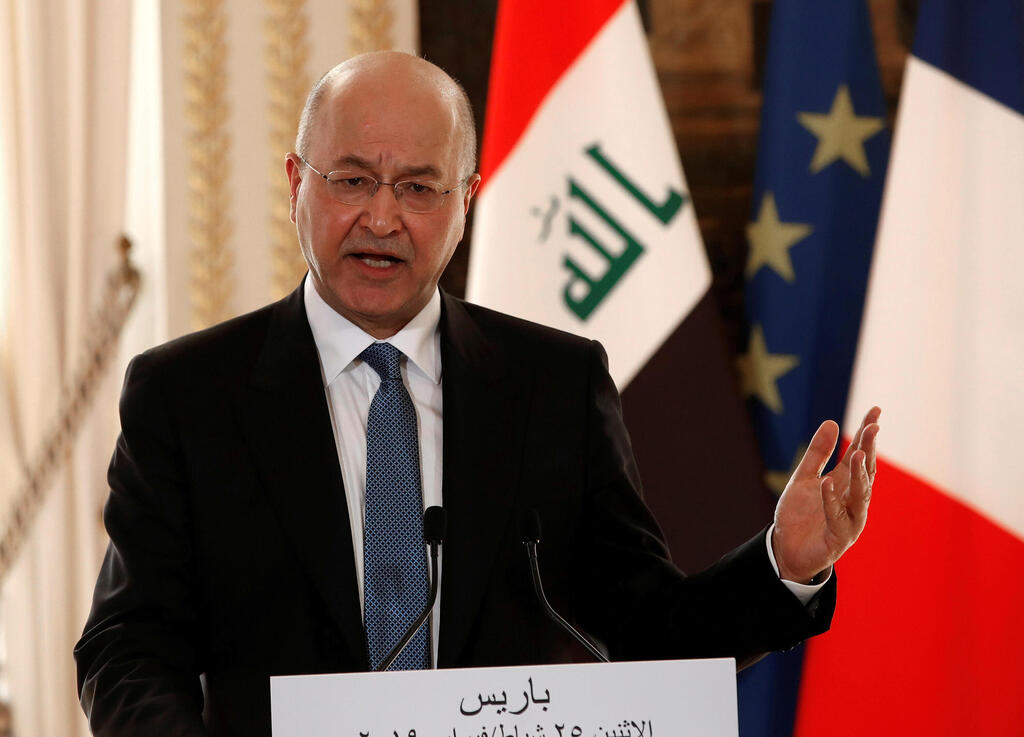Getting your Trinity Audio player ready...
Despite promising calls for peace, normalization between Iraq and Israel is unlikely to pan out anytime in the near future, regional experts believe.
More than 300 Iraqis took part in a historic conference on Friday in Irbil, the capital of Iraq’s Kurdistan Region. Speakers at the event called on Iraq to make peace with Israel and join the Abraham Accords, an agreement that recently saw Israel establish ties with several Arab or Muslim-majority states.
3 View gallery


Iraqis listen to Sahr al-Ta’i at the conference of peace and reclamation organized by U.S. think-tank Center for Peace Communications in Erbil, the capital of northern Iraq’s Kurdistan autonomous region
(Photo: AFP)
The conference was organized by a New York-based group called the Center for Peace Communications, which pushes for improving ties between Israel and the Arab world. Some attended virtually, including Chemi Peres, the son of the late Israeli president, Shimon Peres, and head of the Peres Center for Peace and Innovation.
However, Dr. Ronen Zeidel, an Iraq specialist at the Tel Aviv-based Moshe Dayan Center for Middle Eastern and African Studies, said that peace between the two countries is but a distant dream.
“Normalization is very far away, as long as Iraq is administered the way it is, as long as you have Iranian and pro-Iranian hegemony in Iraqi politics, and as long as Iraq is not stable,” Zeidel told The Media Line referring to the gathering in Irbil as a “shot in the dark.”
There is already a very strong backlash against those who participated publicly in the conference, Zeidel added.
“Now they are under real threat,” he said. “Most of them are Sunni tribal figures. I wouldn’t say that they are representative or a leading element in Iraqi politics, far from it.”
Iraq has officially been at war with Israel since the latter’s founding in 1948. Iraq’s Jewish community lived in the area for several millennia and numbered some 150,000 people until the mid-20th century, when the vast majority fled to Israel due to severe persecution.
The conference in Irbil drew widespread condemnation from Baghdad on Saturday, with government officials calling it an “illegal meeting.”
On Sunday, Iraqi authorities further announced that they would arrest all 300 participants once they had been identified, according to the Iraq News Agency (INA). So far, warrants have been issued for Wisam al-Hardan, Mithal al-Alusi and a senior Iraqi Culture Ministry official named Sahar al-Tai.
Several conference participants have already backtracked from their earlier pro-peace statements.
Al-Alusi, a politician and former member of the Iraq parliament, claimed to have not attended the conference at all. Al-Alusi has long led the charge in calling for peace with Israel and has even made at least two official visits to the country in the past.
Meanwhile, in an article published in the Wall Street Journal on Friday, Wisam al-Hardan, leader of the “Sons of Iraq Awakening” movement, demanded that Iraq join the Abraham Accords and establish full diplomatic relations with Israel. However, al-Hardan – one of the main speakers at the Irbil conference – later issued a video apology and withdrew his support for the event.
Despite the event not being representative of wider Iraqi public opinion, Zeidel still believes that it was impressive.
“It’s outstanding that something like this took place,” he asserted. “First of all, it happened in an area which is technically part of Iraq, in Irbil, the capital of the [Kurdistan Region]. It happened with the approval of the Kurdish authorities, at least 300 personalities participated and the conference was filmed.”
Like Zeidel, Professor Emeritus Michael Eppel of Haifa University, a specialist in Iraq and modern Syria, says that normalization is a far-off prospect.
“As long as Iran continues to exert a very strong influence on Iraq, including on its Shiite militia groups, the chances for peace are slim,” Eppel told The Media Line. “However, there are several Iraqi officials who truly want to establish ties with Israel, including, first and foremost, the Kurds.”
Eppel viewed the conference in Irbil as a positive sign but noted that it may put several pro-peace activists in serious danger.
“We have to encourage ties with Iraq, but do so under the radar,” he said. “We shouldn’t endanger people.”



